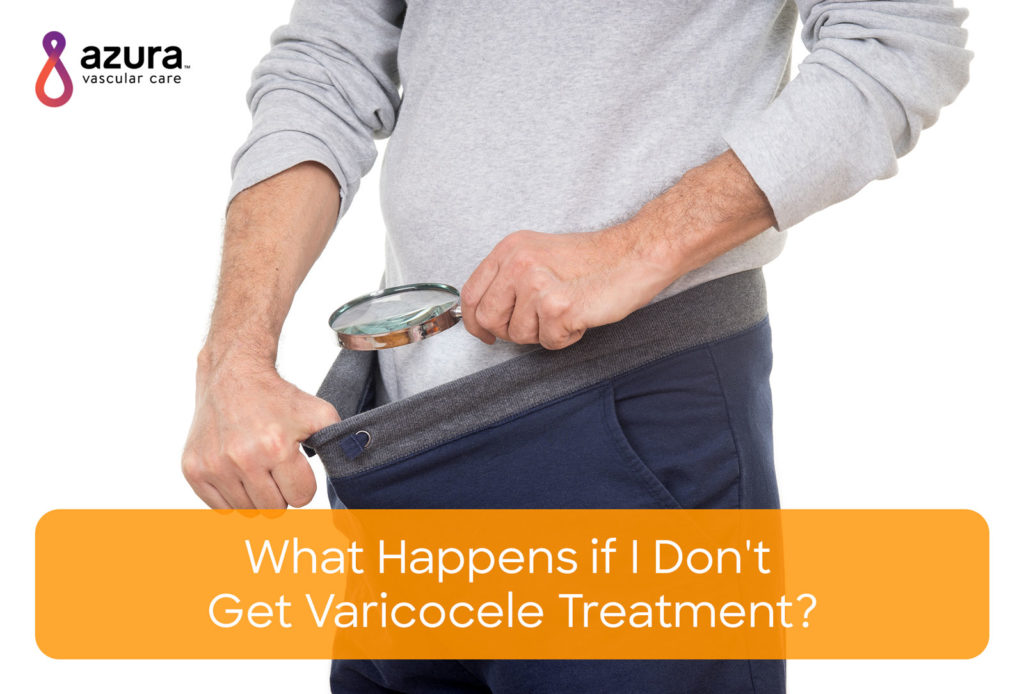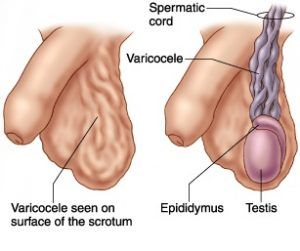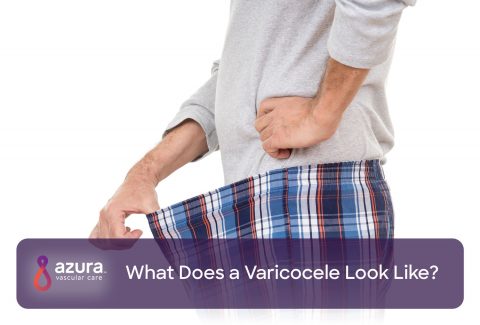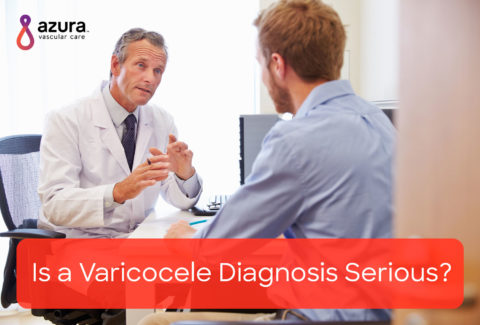
If you have been diagnosed with a varicocele, there are some instances that treatment may not be necessary. In the case of pain, testicular atrophy or infertility, you may want to consider varicocele treatment.
Male infertility is responsible for about half of conception issues in couples looking to get pregnant and, for many, the problem is a low sperm count related to varicoceles. [i] People tend to link male infertility with elevated scrotum temperatures or low testosterone levels. These are common causes, but varicoceles are often the root cause of both these problems. It is estimated that as many as 15 percent of males have a varicocele, including 40 percent of the men experiencing infertility issues. [ii] If you have a varicocele, you should know what happens if you don’t get varicocele treatment.
Symptoms of Varicoceles
 Whether or not you seek treatment for your varicocele depends on a number of factors, including whether you experience symptoms or not. Some men have varicoceles without symptoms like testicular pain. [iii] It’s just as likely, though, that the varicocele side effects like infertility are what sent you to the doctor in the first place.
Whether or not you seek treatment for your varicocele depends on a number of factors, including whether you experience symptoms or not. Some men have varicoceles without symptoms like testicular pain. [iii] It’s just as likely, though, that the varicocele side effects like infertility are what sent you to the doctor in the first place.
Possible varicocele symptoms include:
- Pain in the scrotum — From a dull ache to a sharp, stabbing pain
- Testicular atrophy — The shrinking of one or both testicles.
- A lump in the scrotum or testicle — Typically, the lump is not painful
- Enlargement of a testicle — The swollen side will feel heavy
- Pain that is relieved when you lie down on your back
Without a proper varicocele diagnosis and treatment, these symptoms may worsen and lead to complications.
Possible Complications If You Don’t Get Varicocele Treatment
If you don’t seek treatment for your varicocele, it can damage the affected testicle. In about 85 percent of men, the varicocele occurs on the left side. [iv] The varicocele may cause the testicle to atrophy or shrink. It’s unclear why this happens, but a varicocele is basically a testicular varicose vein, like many people get in their legs. Just like leg varicose veins, a varicocele is linked to malfunctioning valves.
Veins transport blood towards the heart for oxygenation, but they must work against gravity to accomplish the task. To assist in this process, the veins have valves built into their walls that open and close as needed. As the walls of the vein contract to push blood upwards, the valves open. When the muscles relax, the valves close again to keep the blood from flowing backward.
Over time, the valves may not open and close normally, allowing blood to pool. This can happen for a number of reasons, but it is a natural consequence of aging. As a person gets older, the walls of the veins lose some of their elasticity. The weakness in the vein wall means there is less pressure on the valves so they don’t close completely and blood pools between muscle contractions. The pooling blood around the testicle increases the pressure, which may cause the shrinkage.
Infertility is another strong possibility for those who don’t get varicocele treatment. Untreated varicoceles of large veins can cause overheating. That, in turn, affects the number, mobility, and quality of the sperm. [v]
Men who are infertile and diagnosed with varicoceles often have low testosterone levels, too. [vi] Clinical evidence supports the theory that this is due to impairment of the cells that produce testosterone known as Leydig cells. Men who do get varicoceles treatment see an increase in their testosterone levels as a result because these Leydig cells begin to function properly once again.
Opting for Treatment of Your Varicoceles
If you are experiencing varicocele-related infertility or other symptoms, treatment is available. Minimally invasive varicocele embolization is just as effective as methods like surgical ligation and it offers a 90 percent success rate. [vii] Varicocele embolization is performed on an outpatient basis, so there is no hospitalization and a shorter recovery period.
If you already have a varicocele diagnosis or are experiencing symptoms, call 866-705-VEIN (8346) to schedule an appointment with a vascular specialist.
Sources:
[i] https://www.ncbi.nlm.nih.gov/pmc/articles/PMC2664231/
[ii] http://urology.ucla.edu/body.cfm?id=478&action=detail&ref=19
[iii] https://www.mayoclinic.org/diseases-conditions/varicocele/symptoms-causes/syc-20378771
[iv] http://urology.ucla.edu/body.cfm?id=478&action=detail&ref=19
[v] https://www.cdc.gov/reproductivehealth/infertility/index.htm
[vi] https://www.medscape.org/viewarticle/758088
[vii] https://www.health.harvard.edu/newsletter_article/The-psychological-impact-of-infertility-and-its-treatment



